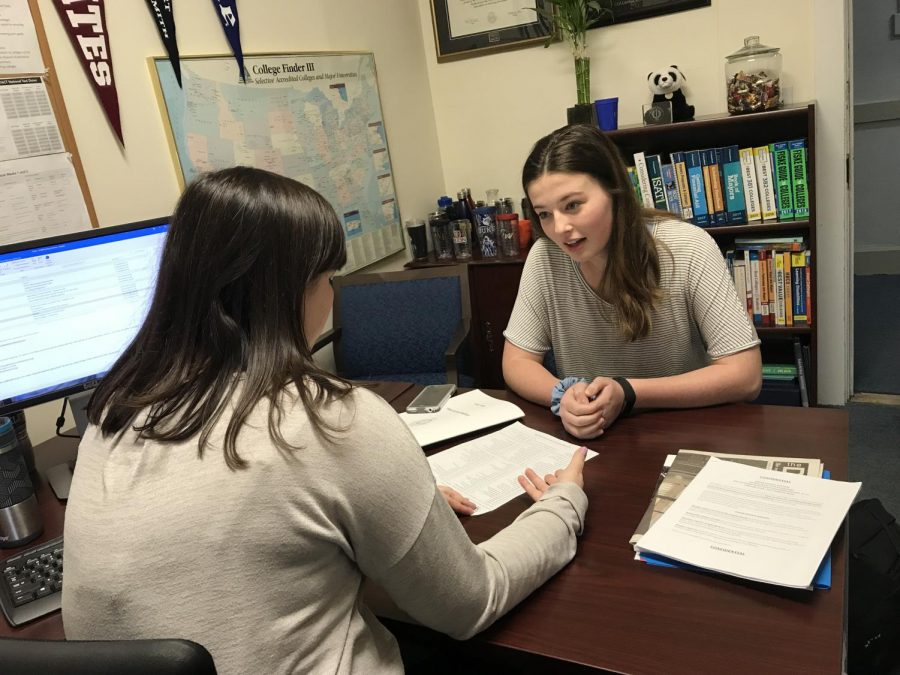Students now have their official college counselors during sophomore year
Credit: Annabel Ives
Sophomore Emma Brenna discusses her course plans with college counselor Rebecca Hall. The Class of 2020 is the first grade of the Upper School to be provided with college counselors during sophomore year. Sophomores often ask their college counselors questions about the advantages of taking certain classes.
April 15, 2018
Students of the class of 2020 are the first group of students to receive college counselors during their sophomore year of high school. Previously, students were assigned college counselors midway through junior year, allowing the counseling program’s main focus to be test taking and college applications. This new protocol provides younger students with access to their counselors regarding matters such as course selection and summer programs.
While some sophomores are happy with this decision, others believe that it will prematurely add unneeded stress to the college counseling process. That said, however, both the College Counseling department and teachers have stressed that college counselors are in no way meant to be stressful for sophomores. In regard to potential anxiety that some have asserted this new initiative may cause, sophomore dean Christopher Loomis explained, “we are hoping to avoid increasing stress and anxiety about the college process.”
“It made sense to give the sophomores a point person when they have questions regarding course selection and testing,” said college counselor Rebecca Hall. In the past, students and parents would email their sophomore dean regarding course selection or a summer program. The dean would then have to refer them to a college counselor. The new process is designed to make communication between students and counselors direct and more efficient. “This kind of cuts out the middleman,” explained Loomis.
Starting counseling early sets the sophomores up for a smooth transition into the more rigorous and demanding junior year by reassuring students about their academic choices, especially regarding class choices for the upcoming year. Since meetings with a counselor are not mandatory, the policy change should not increase stress about the college process or force sophomores to think about college prematurely. Instead, the assignment should be a stress reliever to current and future sophomores.
Despite having advisees for an additional year of high school, counselors have no intention of distributing college lists any earlier. “It shouldn’t change the college process for sophomores at all.” said Hall. “There are no requirements to meet with the counselors, for both students and parents,” she added.
The counselor assignment also allows for student athletes to better understand the college application process to be better prepared for recruitment. As a member of the Varsity Lacrosse Team, sophomore Leah Holmes explained, “My parents and I have been lost before, not knowing what to do or what course requirements would be for potential schools that I am looking at.” Now Holmes and other student athletes will hopefully no longer feel lost.
Some juniors fear that focus on the sophomore class will take away from the focus they require in the college application process. “Sophomores don’t necessarily need college counselors given that college isn’t a huge stress for them yet,” said junior Cristina Paz.
To dispel any fears that the juniors may have, Loomis continued, “Hopefully it won’t be much of a change; the idea is that the college counselors are there as a resource for the students and the families and not that sophomores are regularly seeking out college counselors for advice.” The sophomores are not expected to plan on meeting with their counselor about specific schools such as the juniors, but rather to come to meetings with their counselors with general questions.

